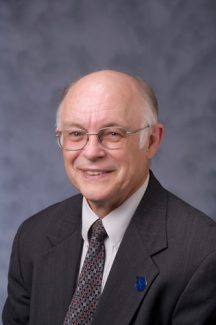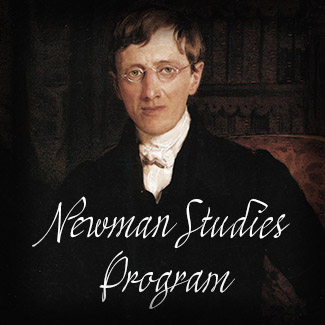The Newman Studies Program (NSP), which has been a part of the Newman curriculum since fall 2011, will offer new courses for the 2017-2018 fall and spring semesters.

The program is based on four educational principles expressed in Blessed John Henry Cardinal Newman’s influential reflections on education, titled “The Idea of a University,” which was published in 1873.
Students are required to take their NSP classes in a four-course sequence of categories that touch on each principle – the Human Story, the Creative Spirit, the Universe We Live In and the Quest for Meaning.
Professor of Sociology and Assistant Undergraduate Dean Larry Heck, Ph.D., has taught for 45 years at Newman and is responsible for coordinating the NSP offerings each semester. Heck also promotes, encourages and facilitates the development of new courses when possible, he said.
“NSPs are beneficial to students because they step outside the usual framework of classes,” Heck said. “We want them to be multidisciplinary and we want the faculty who represent different disciplines to engage with each other and their students and see the marvelous things that happen when we cooperate and share our knowledge.”
All NSP courses have a special focus on helping students to further develop their writing skills, Heck said. “Since it’s not always fixed from one discipline’s perspective, students also have the opportunity to be more integrative and they have opportunities to develop creative thinking skills.”
Below is a quick look at the new NSP courses that are being offered during the fall and spring semesters:
Zero to Infinity … and Beyond
“Zero to Infinity … and Beyond” is team-taught by Associate Professor of Philosophy Jamey Findling, Ph.D., and Associate Professor, Chair and Division of Science and Mathematics John Vogt. The goal of this course is to allow students to “explore infinity, the infinitesimal and zero as a way to connect with the kind of thinking that is common to both philosophy and math,” Findling said.
Findling explains that “both philosophy and math involve ‘taking a step back’ from reality as we normally experience it. This can be hard to do. Our lives are busy and filled with immediate demands, and our brains are wired to respond to concrete needs and threats. But without that ability to take a step back, to think abstractly, we cannot imagine a world different from our own. Abstraction is important for making long-term plans, for keeping things in perspective, even for holding fast to moral and ethical principles.”
Nanoworld: Ethical Risk & Technological Reward
“Nanoworld: Risks & Rewards” is team-taught by Assistant Professor of Chemistry John Leveritt, Ph.D. and Associate Professor of Philosophy Christopher Fox, Ph.D. The goal of the course is for students to understand the ethical and moral issues that are arising from the area of nanotechnology.
“Many futurists believe the world will run fully on nanotechnology,” Leveritt said. “But beyond just understanding nanotech, it’s very important to know what questions need to be asked before this technology further invades everyday life.”
Neuroplasticity in Philosophy & Psychology
“Neuroplasticity in Philosophy & Psychology” will be offered in the spring and is to be team-taught by Associate Professor of Psychology Greg Smith and Associate Professor of Philosophy Christopher Fox, Ph.D.
“The idea is that the brain’s neurological structure not only has the ability to change, but to consciously change itself,” Fox explains. “So we want to help students understand this phenomenon scientifically, and to embrace it as an existential fact about themselves and their own cognitive powers.”
Technology, Power & Philosophy
“Technology, Power & Philosophy” will be offered in the spring and is to be taught by Associate Professor of Philosophy Christopher Fox, Ph.D.
According to the Newman website, “This course provides a philosophical treatment of the concept of technology, equipping students to reflect critically on the technologies by which they live, work and act.”
For a full listing of the 2017-2018 fall and spring NSP courses, click here.


